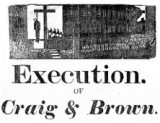 The Word on the Street
The Word on the StreetHow ordinary Scots in bygone days found out what was happening
In the centuries before there were newspapers and 24-hour news channels, the general public had to rely on street literature to find out what was going on. The most popular form of this for nearly 300 years was 'broadsides' - the tabloids of their day. Sometimes pinned up on walls in houses and ale-houses, these single sheets carried public notices, news, speeches and songs that could be read (or sung) aloud. The National Library of Scotland's online collection of nearly 1,800 broadsides lets you see for yourself what 'the word on the street' was in Scotland between 1650 and 1910. Crime, politics, romance, emigration, humour, tragedy, royalty and superstitions - all these and more are here.

<< Home